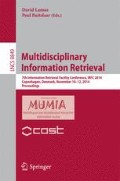Abstract
In this paper we present a methodology which was tested for using eye-tracking to record patent examiners’ visual attention during patent triage. The findings present ways that the eye-tracker can complement current metrics for evaluating information retrieval tools, as well as the ability to investigate further behaviors and actions which cannot be done by currently employed methods.
Access this chapter
Tax calculation will be finalised at checkout
Purchases are for personal use only
Preview
Unable to display preview. Download preview PDF.
References
Just, M.A., Carpenter, P.A.: Eye fixations and cognitive processes. Cognitive Psychology, 441–480 (1976)
Jacob, R.J.K., Karn, K.S.: Eye tracking in human-computer interaction and usability research: Ready to deliver the promise. Cognitive Psychology, 441–480 (1976)
Cairns, P., Cox, A.L.: Research Methods for Human-Computer Interaction, 1st edn. Cambridge University Press, New York (2008)
Duggan, G.B., Payne, S.J.: Skim reading by satisficing: Evidence from eye tracking. Journal of Experimental Psychology: Applied, 228–242 (2009)
Goldberg, H.J., Kotval, X.P.: Computer interface evaluation using eye movements: Methods and constructs. International Journal of Industrial Ergonomics, 631–645 (1999)
Macleod, M.: Usability Evaluation in Industry: Performance Measurement and Ecological Validity. Taylor and Francis, London (1995)
Mosconi, M., Porta, M., Ravarelli, A.: On-line newspapers and multimedia content: an eye tracking study. In: Proceedings of the 26th Annual ACM International Conference on Design of Communication, SIGDOC 2008, pp. 55–64. ACM, New York (2008)
Dumais, S.T., Buscher, G., Cutrell, E.: Individual differences in gaze patterns for web search. In: Proceeding of the Third Symposium on Information Interaction in Context, IIiX 2010, pp. 185–194. ACM, New York (2010)
Azzopardi, L., Vanderbauwhede, W., Joho, H.: Search system requirements of patent analysts. In: Proceedings of the 33rd International ACM SIGIR Conference on Research and Development in Information Retrieval. ACM (2010)
Author information
Authors and Affiliations
Editor information
Editors and Affiliations
Rights and permissions
Copyright information
© 2014 Springer International Publishing Switzerland
About this paper
Cite this paper
Loizides, F., Diallo, B. (2014). Using Eye-Tracking to Investigate Patent Examiners’ Information Seeking Process. In: Lamas, D., Buitelaar, P. (eds) Multidisciplinary Information Retrieval. IRFC 2014. Lecture Notes in Computer Science, vol 8849. Springer, Cham. https://doi.org/10.1007/978-3-319-12979-2_7
Download citation
DOI: https://doi.org/10.1007/978-3-319-12979-2_7
Publisher Name: Springer, Cham
Print ISBN: 978-3-319-12978-5
Online ISBN: 978-3-319-12979-2
eBook Packages: Computer ScienceComputer Science (R0)

